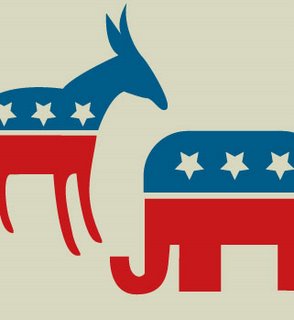
USA Today reports
Paul Aronsohn's interns told him to promote his congressional campaign on MySpace, Facebook and YouTube. Len Munsil's teenage children told him the same thing. Danny Stover's young volunteers convinced him.
All three candidates have an active presence on the popular websites, which are emerging forces in this year's elections. YouTube, a video-sharing site, didn't exist in 2004, and networking sites MySpace and Facebook were new and originally catered mostly to college students.
Munsil, a Republican challenging Arizona Gov. Janet Napolitano, a Democrat, let his son Will, 19, and daughter Leigh, 18, set up his MySpace and Facebook profiles. "They said it was a great way to communicate with young voters," he says. "We're looking for any opportunity to reach people inexpensively."
The results surprised him. People who learned about his campaign on the sites, he says, "have gotten involved, are coming to events, showing up at debates." Some polling data suggest he's faring better among younger voters, Munsil says. Napolitano's campaign hasn't added material to her profile on Facebook, and she doesn't have a profile on MySpace. Her campaign ads are on YouTube.
Online converts
Stover, an Illinois Democrat trying to unseat Republican Rep. John Shimkus, wasn't very Internet-savvy when his volunteers began talking to him about MySpace and Facebook. "It wasn't too long ago I had a hard time opening up my e-mail," he admits. He's a fan now, especially after receiving $8,000 in online donations.
Shimkus' campaign website includes links to his Facebook and MySpace profiles. The MySpace link doesn't work, and his Facebook profile includes a note referring readers back to his campaign site.
Aronsohn, a Democrat running against Republican Rep. Scott Garrett in New Jersey, hopes to connect with younger people who don't usually vote. "Whether it means more votes in the end, I don't know," he says. "But it's a new way to reach people."
Garrett doesn't have a profile on MySpace or Facebook.
Profiles on social-networking websites can become platforms for debate, organizing and get-out-the-vote efforts.
They also can be forums for rival candidates, whose supporters often add critical comments to politicians' profiles. Sen. Debbie Stabenow's Facebook profile includes messages from fans, as well as comments chiding the Michigan Democrat for voting to build a wall on the U.S.-Mexico border.
Democratic strategist Chris Lehane says many politicians struggle with how to use the sites. "To effectively do it, you have to do something that is completely inconsistent for candidates: cede control," he says. "When someone comes back at you or puts out information that's inconsistent with your message, you have to take that in stride and go with it."
MySpace spokesman Jeff Berman says the challenge for candidates is to "communicate not only authentically, but in compelling ways that have 'viral' power." A topic that spreads spontaneously online is considered "viral."
Video is the way to do that, says Michael Cornfield, who teaches the Internet's effect on politics at George Washington University. Candidates e-mail ads, solicit money online and use YouTube to debut ads that might not appear on TV.
By 2008, Cornfield says, every campaign will videotape rival candidates during public appearances, and gaffes will go online almost instantly. He predicts members of Congress will videotape explanations of their various votes and e-mail them to constituents who care most about a particular issue.
"YouTube is totally transforming," he says. "I expect politicians to flock to this."
Amplifying support
Andrew Rasiej, a technology adviser for Howard Dean's 2004 presidential campaign, which helped pioneer online fundraising and organizing, says he doesn't think politicians wield the Internet's power most effectively.
"It is yet to be demonstrated that the Internet ... actually changes votes," says Rasiej, founder of the Personal Democracy Forum, an online magazine about technology and politics. "Just because a politician has his own page on MySpace, it doesn't mean he's listening to the social network he's joined." What does work is supporters of a politician "using Facebook or MySpace to amplify their support through a network of friends," he says.
One example of that approach is ProgressNowAction.org, founded three years ago in Colorado. The site allows people to use it to recruit supporters, organize events and post petitions.
The site had 9,400 members at the beginning of this year and now has more than 100,000. An Ohio branch just opened, and more are planned, founder Michael Huttner says.
"This is the future of Internet organizing," he says. "People are having conversations, organizing themselves and having a real effect."
Dee Margo, an El Paso Republican running for a seat in the Texas Senate, has Facebook and MySpace profiles. He says the sites already are boosting his campaign.
"Any time you touch a voter, it's an important aspect of a campaign," he says. "And if this is another method to touch them, shoot, you betcha."
Share ideas that inspire. FALLON PLANNERS (and co-conspirators) are freely invited to post trends, commentary, obscure ephemera and insightful rants regarding the experience of branding.
Wednesday, October 18, 2006
Politics 2.0: Politicians and Social Media
Subscribe to:
Post Comments (Atom)















No comments:
Post a Comment